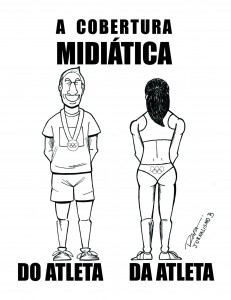This post is part of our special coverage London 2012 Olympics.
In Brazil this Olympics, greater awareness of mainstream media's take on female athletes has opened up space for citizen media debate, challenging the current way major events are broadcast and reported.
Ativismo de Sofá [pt] blog comments on news [pt] reporting claims that an Australian swimmer is said to be overweight. Apart from citing Twitter controversy between a male journalist and Brazil's women's soccer team supporters, the blog post moves on to comment on the issue surrounding the athlete's uniforms:

Mainstream media coverage as it is for male and female athletes. Image available from Jornalismo B, under CC BY-NC-SA 2.5.
Essa objetificação passa pela desvalorização do esporte feminino. Não foram poucas as vezes em que ouvi, por exemplo, que o vôlei masculino é melhor que o feminino. Ou que o futebol masculino é superior ao feminino e etc. Então se o esporte feminino não tem tantos atrativos quanto o masculino, o que o torna viável, inclusive financeiramente? O corpo da atleta. Ao menos é isso que parece pensar uma parte da mídia esportiva, quando o esporte e a superação deveriam ser as estrelas dos Jogos.
In another blog post, Jornalismo B [pt] reports how the sexual orientation of Brazil's handball team goalkeeper became a top priority for Brazilian journalists, and led them to miss the perspective of the “athlete's great performance in her role” and the series of games that team had been playing.
Machismo chato de cada dia [pt], in the post Olimpíadas do Machismo (Machismo Olympics), classifies the reports focused on the beauty of Olympic female athletes as “non-news”. The post continues:
Um espetáculo de desrespeito com tod@s nós, mas principalmente com elas, mulheres que entraram na competição representando seus países após anos de esforço e resumidas a quilos a mais/menos, cabelos, sorrisos, e claro: bundas.
The blog Direitos Fundamentais LGBT [pt], discussing human rights in its various manifestations, elaborates on the discrimination issues involving women, gays and sports:
…a discriminação na Educação Física e no esporte é construída em cima de uma imagem estereotipada que reforça a identidade masculina dessas práticas culturais. Logo, a homossexualidade e a feminilidade são utilizadas como referências negativas.
To the blog Pílulas Diárias [pt], the presence of women in the Olympics “poses a challenge to male authority”. Adding yet another element to question common sense, the author discusses the logic behind the division between men's teams and women's:
A ideia de que meninos jogam num lugar e meninas em outro não é algo inerente à natureza humana. É uma imposição social.
Claro que sempre haverá tipos diferentes de atletas, mas nada obriga que o critério tenha que ser o de gênero. Por que não considerar a força, o peso, a agilidade? A divisão com base no sexo é arbitrária. E é mais uma forma de nos dividir e nos faz sentir diferentes uns das outros.
The idea that boys should play in distinct spaces than girls isn't something inherent to human nature, it is a social imposition. It is clear that there will always be different types of athletes, but it isn't mandatory that the criteria for such distinction must be that of gender. Why not consider strength, weight, agility? Sex based division is arbitrary. And is yet another tool to keep us apart and make us feel different from each other.
This post is part of our special coverage London 2012 Olympics.







3 comments
Very comprehensive article. On the lighter side, I have to recommend this slice of Olympics sexism from The Daily News…
http://www.the-daily-news.co.uk/2012/07/the-sexist-olympics-our-round-up-of-the-latest-womens-events-by-gary-and-mike-in-the-pub.html